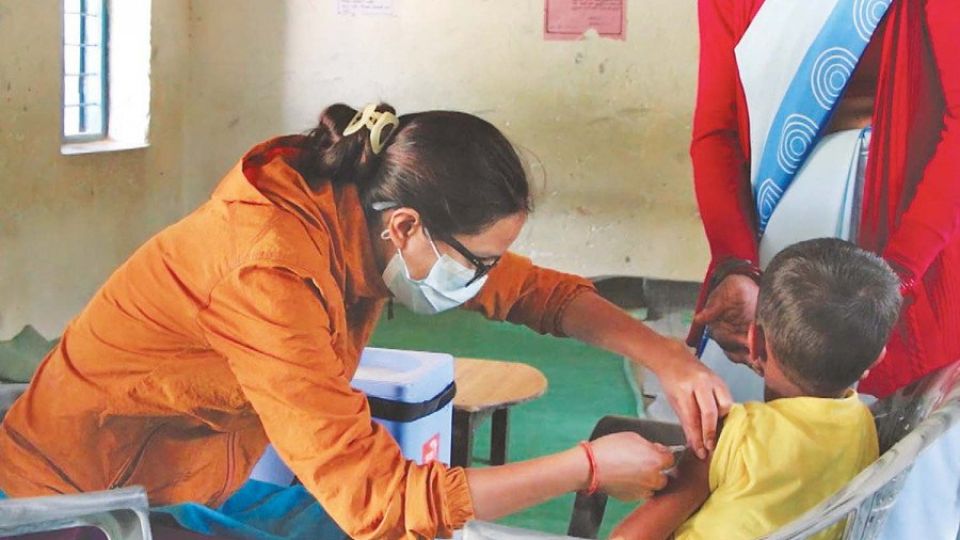October 11, 2023
KATHMANDU – Around 5.7 million children under five years of age and those under 15 years from 24 districts will be inoculated with the measles-rubella vaccine in a nationwide drive next year.
Officials say the plan is a routine programme to eliminate the disease from the country.
Nepal committed to eliminating measles by 2026 after missing the deadlines of 2023 and 2019 earlier.
“We have started preparations for launching a nationwide measles-rubella campaign in March-April of next year,” said Dr Abhiyan Gautam, chief of the immunisation section at the Family Welfare Division of the Department of Health Services. “The Global Alliance for Vaccine and Immunisation (GAVI), which is the main donor of vaccines, has responded positively to provide the doses.”
Measles is a highly contagious viral disease transmitted through fluids from the nose, mouth or throat of an infected person. The virus infects the respiratory tract and then spreads throughout the body. It remains a big cause of death among young children globally, despite the availability of a safe and effective vaccine, according to the World Health Organisation. It can be potentially deadly for unvaccinated people.
The Ministry of Health and Population launched a nationwide drive against measles and rubella every four years, targeting children who may have missed the vaccine. Under the campaign, all eligible children under five get jabbed with the measles-rubella vaccine. This year, health authorities have planned to vaccinate all eligible children under 15 from 24 districts, which have either witnessed outbreaks of the deadly virus or adjoin such districts.
For that, the government had requested the GAVI for vaccine doses.
“Districts in which we have been planning to inoculate all eligible children under 15 years include Kathmandu, Lalitpur and Bhaktapur,” said Gautam. “Districts of the Kathmandu Valley also face a high risk of measles outbreak.”
Nepal has witnessed a massive measles outbreak since the start of 2023. One person died and 17 districts including Kathmandu reported measles outbreaks. Health authorities had launched additional vaccination drives in the affected areas, using the doses supplied by GAVI.
Public health experts say the outbreak of the deadly viral disease at the start of 2023 shows that the country is nowhere close to meeting the measles elimination target. To declare measles eliminated, the number of cases should be less than five in every 1,000,000 people or no cases throughout the year.
A report of the Nepal Demographic and Health Survey-2022 carried out by the Ministry of Health and Population shows that four percent of children in the 12 months to 23 months age group have received no vaccination.
This figure was just one percent in 2016, and the rapid surge in the number of unvaccinated children poses a serious threat to the country’s achievements in immunisation made over the years through huge investments, warn child health experts.
The health ministry had also launched a nationwide door-to-door campaign to “search and inoculate” children who missed the routine immunisation programme following the report’s publication.
Officials say more than 2,000 children across the country, who had not taken even a single dose of the vaccine, were inoculated in the campaign. Thousands of other children, who did not complete all doses of routine vaccines, were also inoculated.
Child health experts say low vaccination coverage, floating population, lack of public awareness about the importance of vaccines and apathy of the government agencies concerned for plugging the loopholes are some reasons behind regular measles outbreaks in various parts of the country.
Doctors say people of all age groups are vulnerable. Underage children, pregnant women, elderly people and those with weak immunity, such as HIV-infected people, are highly vulnerable.
Early measles symptoms, which usually appear 10–12 days after infection, include high fever, runny nose, bloodshot eyes and tiny white spots inside the mouth. Several days later, a rash develops on the face, upper neck and other body parts.
Some people may have severe complications, such as pneumonia and encephalitis, which may lead to death.
Measles was endemic in Nepal and an average of 90,000 cases were recorded every year from 1994 to 2004. Routine measles vaccination began in the country in 1979, starting with three districts. The campaign was extended nationwide after 10 years. Still, measles continues to stalk children across the country.


